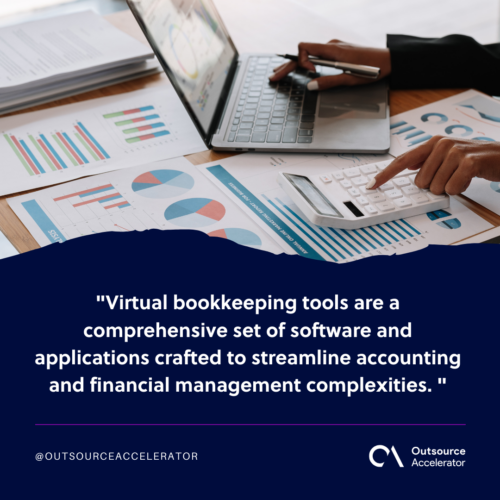10 virtual bookkeeping tools to try in 2025

List of 10 best virtual bookkeeping tools
In the early years of bookkeeping, everything was done manually. Bookkeepers meticulously recorded transactions using pen and paper, poring over ledgers for hours.
Every number and every detail had to be precisely written down, and any mistake meant starting over again.
A manual approach, while essential, was time-consuming and prone to errors, impacting the accuracy of financial records and slowing down productivity.
Fast forward to today’s digital era, and the bookkeeping landscape has radically transformed. The emergence of virtual bookkeeping tools has completely revolutionized how businesses manage their finances.
This article delves into the importance of virtual bookkeeping tools, exploring their functionalities, advantages, and the top ten software you should try in 2025.
What are virtual bookkeeping tools?
Virtual bookkeeping tools are a comprehensive set of software and applications crafted to streamline accounting and financial management complexities.
From mundane data entry tasks to the meticulous tracking of expenses, invoicing, and generating detailed financial reports—these tools liberate businesses from time-consuming tasks.
Further, virtual bookkeeping tools operate seamlessly in the cloud. They allow remote bookkeepers to access and modify financial data from any corner of the world, as long as there’s an internet connection.
Offshoring firms like Boomering find bookkeepers who keep updated with these tools to deliver the best service to clients.

Benefits of virtual bookkeeping tools
Let’s explore the significant advantages of leveraging virtual bookkeeping tools:
Real-time collaboration
One of the primary advantages of virtual bookkeeping tools is their ability to foster real-time collaboration among team members and stakeholders.
Multiple users can simultaneously access and work on financial records, enhancing transparency and efficiency.
These tools promote seamless teamwork while maintaining data security through features like shared access and user permissions.
Automated data entry
Virtual bookkeeping tools leverage automation to capture and process data accurately. They also minimize human error and save considerable time.
Moreover, virtual bookkeeping tools can automatically do the following functions:
- Import bank transactions
- Categorize expenses
- Reconcile accounts
- Streamline the entire virtual bookkeeping process
Customized dashboards
Many virtual bookkeeping tools offer personalized dashboards that comprehensively overview a company’s financial health.
These dashboards can be customized to display key metrics, trends, and reports. They allow users to make informed decisions based on real-time data insights.
Such visual representations simplify complex financial information, enabling better analysis and strategic planning.
Audit trail and compliance
Maintaining a clear audit trail and ensuring compliance with accounting standards and regulations are crucial for businesses.
Virtual bookkeeping tools often include the following features:
- Track changes made to financial records
- Generate detailed audit logs
- Help companies adhere to regulatory requirements
This not only facilitates audits but also minimizes the risk of non-compliance.
Predictive analytics
Advanced virtual bookkeeping tools utilize predictive analytics to forecast future financial trends based on historical data.
These tools can provide valuable insights into cash flow projections, budget forecasts, and potential financial risks.
This proactive approach empowers businesses to make proactive decisions and mitigate potential financial challenges.
10 best virtual bookkeeping tools in 2024
Choosing the right virtual bookkeeping tool depends on a business’s specific needs and scale.
In no particular order, let’s delve into the top ten virtual bookkeeping tools that are making waves in 2024.
Each tool offers distinct features and functionalities, catering to diverse requirements. We’ll explore their unique features and functionalities, as well as their pros and cons.
1. FreshBooks
FreshBooks continues to stand out as a user-friendly cloud-based accounting software. Its intuitive interface caters to freelancers, small businesses, and self-employed professionals.
It simplifies tasks like invoicing, expense tracking, and time management by offering essential accounting functionalities.
FreshBooks’ accessibility through various devices and robust reporting tools makes it popular.
Features:
- Invoicing and payment processing
- Expense tracking
- Time tracking and project management
- Customizable reports
- Tax preparation tools
| Pros | Cons |
|
|
2. Link My Books
Link My Books specializes in simplifying Amazon accounting, seamlessly integrating with Amazon Seller Central.
This is one of the virtual bookkeeping tools that automates the process of importing sales and expense data into accounting software.
Its focus on e-commerce accounting streamlines reconciliation and helps sellers gain more precise insights into their finances.
Features:
- Amazon and eBay accounting integration
- Automated transaction reconciliation
- Multicurrency support
- VAT tax management
| Pros | Cons |
|
|
3. Holded
As an all-in-one business management software, Holded goes beyond standard bookkeeping. It covers inventory management, project tracking, and CRM functionalities. This makes it a comprehensive solution for small to medium-sized enterprises.
Holded’s interface emphasizes user-friendliness, ensuring efficient management of finances and operations.
Features:
- Inventory management
- Project accounting
- CRM integration
- Customizable workflows
| Pros | Cons |
|
|
4. Xero
Xero is one of the best virtual bookkeeping tools known for its flexibility, making it suitable for businesses of all sizes.
Operating on the cloud simplifies tasks like creating invoices, managing bank transactions, and handling payroll.
Its strength lies in the diversity of integrations and customizable features, allowing companies to tailor their accounting processes.
Xero stands out as a reliable choice for businesses seeking adaptable solutions due to its scalability and efficiency.
Features:
- Bank reconciliation
- Payroll processing
- Inventory tracking
- Third-party app integrations
| Pros | Cons |
|
|
5. QuickBooks
QuickBooks maintains its status as a well-known tool in the accounting sphere. Its interface is easy to navigate, making it accessible while offering robust accounting functionalities.
Businesses benefit from its ability to handle expense management, invoice generation, and financial tracking seamlessly.
QuickBooks further enhances its utility by integrating smoothly with various third-party applications.
The creators of this software continuously elevate its overall functionality and appeal to businesses aiming for comprehensive financial management.
Features:
- Invoicing and expense tracking
- Tax preparation
- Reporting and analytics
- Integration with other Intuit products
| Pros | Cons |
|
|
6. Multiview
Targeting mid-sized and large enterprises, Multiview stands out for its comprehensive financial management capabilities.
Multiview caters to complex accounting needs by offering features like advanced reporting, intercompany accounting, and multiple currency support.
Its scalability aligns well with growing businesses requiring robust financial tools.
Features:
- General ledger and financial reporting
- Accounts payable and receivable
- Budgeting and forecasting
- Fixed assets management
| Pros | Cons |
|
|
7. Hubdoc
Hubdoc is one of the compelling virtual bookkeeping tools that make managing documents easy by automating the collection of financial paperwork. It gathers bills, receipts, and invoices, streamlining bookkeeping tasks.
By working seamlessly with accounting software, Hubdoc boosts accuracy and reduces the need for manual data entry.
This virtual bookkeeping tool simplifies organizing and storing essential financial documents, helping businesses maintain more precise records and improve efficiency.
Features:
- Document management and organization
- Automatic data extraction
- Integration with accounting software
- Audit trail for documents
| Pros | Cons |
|
|
8. Expensify
Expensify specializes in handling business expenses, making tracking and reporting hassle-free.
Its mobile app allows users to snap receipts and sort expenses while moving. The user-friendly interface simplifies the process, cutting down on manual work.
Expensify’s automation features play a crucial role in ensuring that managing expenses is both efficient and precise, saving time and effort for businesses of all sizes.
Features:
- Expense tracking and reporting
- Receipt scanning and OCR
- Reimbursement automation
- Corporate card management
| Pros | Cons |
|
|
9. Zoho Books
Zoho Books is one of the comprehensive virtual bookkeeping tools designed specifically for small businesses. Its straightforward design makes tasks like creating invoices, tracking expenses, and managing inventory hassle-free.
Its strength is its adaptability; it can be customized to suit specific business needs. Moreover, its seamless integration with other Zoho applications expands its functionality.
Zoho Books is a reliable choice for companies aiming for a straightforward yet functional accounting solution.
Features:
- Invoicing and expense tracking
- Inventory management
- Bank reconciliation
- Integrated collaboration tools
| Pros | Cons |
|
|
10. FreeAgent
FreeAgent caters to freelancers and small businesses by simplifying various accounting processes. It excels in generating invoices, monitoring expenses, and handling tax-related matters.
What sets this bookkeeping software apart is its emphasis on automation, reducing manual financial management efforts.
Additionally, it provides real-time insights into financial data, aiding users in making informed decisions promptly.
FreeAgent’s user-friendly interface and focus on streamlining accounting tasks make it a valuable tool for efficient financial management among smaller entities.
Features:
- Invoicing and project management
- Time tracking
- Tax estimation and reporting
- Bank reconciliation
| Pros | Cons |
|
|
Investing in virtual bookkeeping tools
Investing in virtual bookkeeping tools can provide great advantages for businesses looking to enhance efficiency, accuracy, and overall financial management. They can save time, reduce errors, and focus more on strategic growth.
Embracing technology will not only streamline your bookkeeping processes but also provide valuable insights that drive informed decision-making.
Make the leap today and transform your financial operations with the right virtual bookkeeping tools!
Virtual bookkeeping tools FAQs
In this section, we’ll address the frequently asked questions surrounding virtual bookkeeping tools:
What does a virtual bookkeeper do?
Virtual bookkeepers manage financial records for businesses remotely, handling tasks such as:
- Tracking income and expenses
- Reconciling bank statements
- Preparing financial reports
- Ensuring compliance with tax regulations
They utilize online tools to streamline bookkeeping processes, allowing business owners to focus on growth while maintaining accurate and up-to-date financial information.
Is there high demand for virtual bookkeepers?
Yes, there is a growing demand for virtual bookkeepers. As more businesses move online and seek efficient, cost-effective financial management solutions, the need for skilled virtual bookkeeping professionals has risen significantly.
Companies of all sizes are looking to outsource their bookkeeping tasks to focus on core operations, creating ample opportunities for virtual bookkeepers in various industries.
Is virtual bookkeeping profitable?
Yes, virtual bookkeeping can be quite profitable. It offers lower overhead costs compared to traditional bookkeeping methods, allowing businesses to save on expenses like office space and equipment.
Additionally, by leveraging technology, virtual bookkeepers can manage multiple clients efficiently, increasing their potential revenue.
Many businesses also find that outsourcing bookkeeping helps them focus on core activities and improve overall financial management, further enhancing profitability.








 Independent
Independent




